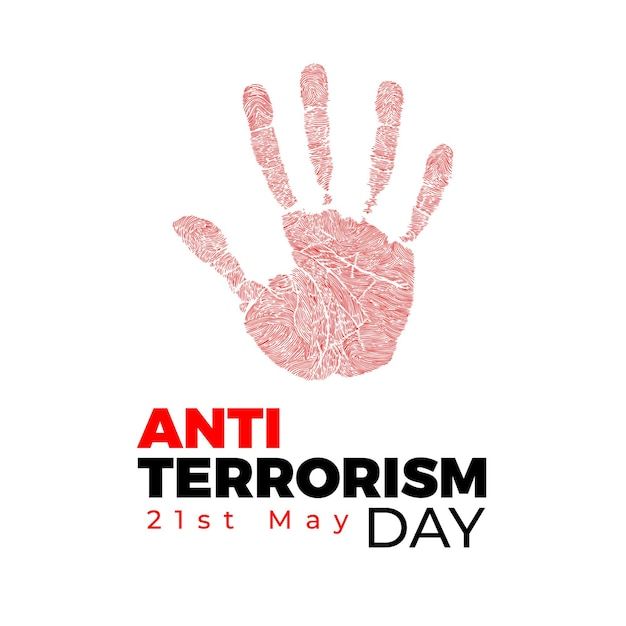🕊️ Introduction: A Day of Reflection, Unity, and Action
In a world where hatred, division, and extremism continue to pose threats to humanity, National Anti-Terrorism Day stands tall as a reminder of peace, unity, and national responsibility. Observed annually on May 21, this day marks the assassination anniversary of former Indian Prime Minister Rajiv Gandhi and serves as a clarion call against terrorism in all its forms.
- 📜 History of National Anti-Terrorism Day
- 📅 Timeline: National Anti-Terrorism Day Through the Years
- 🔍 7 Alarming Facts About Terrorism in India and the World
- ❓ FAQs About National Anti-Terrorism Day
- ❓ What is the objective of Anti-Terrorism Day?
- ❓ Why May 21?
- ❓ Who observes this day?
- ❓ Is Anti-Terrorism Day celebrated globally?
- 📣 Wishing Messages for National Anti-Terrorism Day
- 🔍 Significance of National Anti-Terrorism Day
- 1. Honoring Victims and Martyrs
- 2. Educating the Youth
- 3. Building Vigilant Citizens
- 4. Encouraging Policy Support
- 🧠 Impact in Our Daily Lives
- 🎓 Observance Across India
- ✍️ The Anti-Terrorism Day Pledge
- 📌 Important Points to Remember
- 🧭 Conclusion: Let Peace Be the Legacy We Pass On
It’s not just about remembering the past—it’s about empowering the present and safeguarding the future. Let’s explore everything about this solemn but crucial day, through a lens of humanity and collective purpose.
📜 History of National Anti-Terrorism Day
National Anti-Terrorism Day was instituted by the Government of India in 1991, soon after the tragic assassination of Rajiv Gandhi, who was killed by a human bomb on May 21, 1991, in Sriperumbudur, Tamil Nadu. The attack was carried out by members of the Liberation Tigers of Tamil Eelam (LTTE), a separatist group from Sri Lanka.
To honor his memory and to raise awareness about the threats of terrorism, the Indian government declared May 21 as National Anti-Terrorism Day. Over the years, this observance has expanded in meaning—not only to remember victims of terrorism but to educate youth, spread messages of peace, and strengthen India’s fight against radical ideologies.
📅 Timeline: National Anti-Terrorism Day Through the Years
| Year | Milestone |
|---|---|
| 1991 | Rajiv Gandhi assassinated by LTTE suicide bomber |
| 1992 | Government of India officially observes May 21 as Anti-Terrorism Day |
| 2001 | Post 9/11, India strengthens counter-terrorism cooperation globally |
| 2008 | After 26/11 Mumbai attacks, India intensifies internal security policies |
| 2020 | Virtual campaigns launched to combat online radicalism and fake news |
| 2024 | Nationwide awareness campaigns in schools, colleges, and government bodies held |
🔍 7 Alarming Facts About Terrorism in India and the World
Over 100,000 people have died in terrorist attacks globally in the past two decades.
India ranks among the top 10 most impacted countries due to regional insurgencies and cross-border terrorism.
Terrorism causes psychological trauma, not just physical destruction.
Youth are often targeted by radical propaganda, especially via online platforms.
Cyberterrorism is a rising threat with AI-generated fake content and hacking attacks.
Counter-terrorism efforts in India now include cyber units, intelligence training, and international partnerships.
Peace education is gaining popularity to build a non-violent, inclusive future.
❓ FAQs About National Anti-Terrorism Day
❓ What is the objective of Anti-Terrorism Day?
To educate people about the devastating consequences of terrorism, promote peace, harmony, and remind citizens of their duty toward national unity and safety.
❓ Why May 21?
This is the day former Prime Minister Rajiv Gandhi was assassinated in 1991. It became symbolic of the fight against terrorism.
❓ Who observes this day?
All government offices, educational institutions, and public organizations observe the day with pledges, speeches, awareness activities, and campaigns.
❓ Is Anti-Terrorism Day celebrated globally?
While May 21 is specific to India, many countries have their own days to honor anti-terrorism efforts. The UN observes August 21 as the International Day of Remembrance and Tribute to Victims of Terrorism.
📣 Wishing Messages for National Anti-Terrorism Day
🕊️ “Let peace be our weapon, and unity our strength. Say no to terrorism today and every day.”
🇮🇳 “On National Anti-Terrorism Day, let’s honor the brave and build a world free of fear and hate.”
✌️ “May truth triumph over terror, and love win over hate. Spread awareness, not violence.”
🕯️ “Let’s remember the victims and vow to never let violence define our world.”
🔍 Significance of National Anti-Terrorism Day
1. Honoring Victims and Martyrs
This day is a national tribute to people who lost their lives in terrorist attacks—from political leaders to innocent civilians and brave soldiers.
2. Educating the Youth
Awareness campaigns aim to prevent radicalization by fostering critical thinking, empathy, and cultural understanding.
3. Building Vigilant Citizens
Security is not just the job of armed forces—it’s a collective responsibility. Citizens are encouraged to report suspicious activity, resist hate, and foster communal harmony.
4. Encouraging Policy Support
The day reminds us to strengthen laws, support anti-terror operations, and empower internal security agencies with resources and reforms.
🧠 Impact in Our Daily Lives
Though terrorism may feel distant, its effects trickle into daily life through:
| Area | How it Affects You |
|---|---|
| 🧳 Travel | Increased security checks and surveillance |
| 📰 News & Media | Rise in fear-based messaging, misinformation |
| 👨👩👧👦 Social Harmony | Communal tensions can disrupt societal peace |
| 🧑🏫 Education | Propaganda targets uneducated or isolated youth |
| 💰 Economy | Terrorism affects investments, tourism, and jobs |
By observing National Anti-Terrorism Day, we commit to being informed, compassionate, and socially responsible citizens.
🎓 Observance Across India
Schools and Colleges: Students take the Anti-Terrorism Pledge and participate in essay, debate, and awareness activities.
Government Offices: Employees take official oaths against terrorism and uphold constitutional values.
Media: Channels broadcast documentaries, stories of victims, and national unity messages.
NGOs: Host public events, peace walks, and community workshops.
✍️ The Anti-Terrorism Day Pledge
“We, the people of India, having abiding faith in our country’s tradition of non-violence and tolerance, hereby solemnly affirm to oppose with our strength all forms of terrorism and violence. We pledge to uphold and promote peace, social harmony, and understanding among all fellow human beings and fight the forces of disruption threatening human lives and values.”
📌 Important Points to Remember
Date: May 21
Started in: 1991
Occasion: In memory of Rajiv Gandhi’s assassination
Observed by: Government, schools, citizens
Main focus: Awareness, unity, non-violence, education against extremism
Pledge: Taken across the nation
Trending hashtags: #AntiTerrorismDay #SayNoToTerrorism #PeaceMatters
🧭 Conclusion: Let Peace Be the Legacy We Pass On
Terrorism isn’t just an act of violence—it’s an attack on the soul of humanity. In remembering the loss of Rajiv Gandhi and countless others, we must strive to eradicate not just terrorism but also the roots of hatred, ignorance, and division.
National Anti-Terrorism Day is not merely a date on the calendar—it’s a call to action, a day of remembrance, and a reminder that the fight for peace, tolerance, and unity is an ongoing mission.
Together, as citizens of a democratic nation and members of a shared humanity, let us raise our voices, open our minds, and guard our hearts against any ideology that promotes fear over fraternity.
🕊️ Let this day not be a reminder of fear, but a celebration of courage, unity, and unwavering hope.








